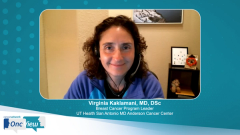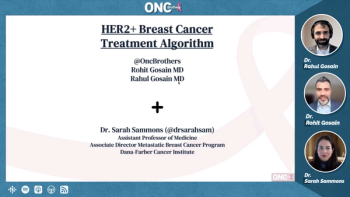
HER2+ Breast Cancer: Frontline Treatment Options
A review of the currently available frontline treatment options for HER2+ breast cancer.
Matthew Fowler: What are some of the treatment options for a patient with HER2-positive breast cancer in the frontline setting?
Virginia Kaklamani, MD, DSc: In the frontline metastatic setting, typically our go-to regimen comes from the CLEOPATRA clinical trial [NCT00567190], which is taxane, trastuzumab, and pertuzumab. This is our first-line targeted therapy plus chemotherapy. This is a well-proven regimen based on the CLEOPATRA trial, and this is considered our standard-of-care option.
Matthew Fowler: What goes into selecting an appropriate regimen for each patient?
Virginia Kaklamani, MD, DSc: The appropriate regimen depends on what the line of treatment is. In the first-line metastatic setting, it’s pretty well established that the CLEOPATRA regimen is the way to go, but this also depends on whether that patient received neoadjuvant chemotherapy, adjuvant therapy, and how long the interval was between the end of her adjuvant therapy to the development of metastatic disease. If, for example, you have a patient who received neoadjuvant anti-HER2-based therapy, had significant residual disease, continued in the adjuvant setting to receive anti-HER2 therapy, and then within a couple of months had progression to metastatic disease, then you would think twice about giving the exact same regimen you just gave in that first-line metastatic setting. But if you have a patient that has de novo metastatic disease, then giving anti-HER2 therapy based on the CLEOPATRA regimen is the way to go.
Matthew Fowler: Could you talk about the FDA-approved combination to give us a general overview of pertuzumab, trastuzumab, and hyaluronidase for patients with HER2-positive breast cancer?
Virginia Kaklamani, MD, DSc: Typically, these monoclonal antibodies for anti-HER therapy have been IV options. The 2 approved antibodies are trastuzumab and pertuzumab. Most recently, there has been the opportunity to give subcutaneous injection either of one of them or both in combination. The subcutaneous injection of the trastuzumab, pertuzumab, and hyaluronidase is also called PHESGO. This is convenient for patients. It means that instead of a patient coming into our office and spending a couple of hours in the infusion room, she can spend 5 to 10 minutes receiving a subcutaneous injection and then going home. The majority of these patients would rather get a subcutaneous dose instead of an IV dose.
Matthew Fowler: How does the administration differ in the early-stage vs the metastatic setting? Is there a specific difference you see there?
Virginia Kaklamani, MD, DSc: In the early-stage setting, we give chemotherapy to these patients. They receive typically 2 chemotherapeutic agents together with the 2 anti-HER2 therapies. There are a few ways of doing this. One is just giving everything through IV, which makes for a long infusion day, or you can give the 2 chemotherapeutic agents IV and then you can give the 2 antibodies subcutaneously in the form of PHESGO. Another approach is to give the neoadjuvant chemotherapy all IV and then, if you’re going to give adjuvant trastuzumab and pertuzumab, you can switch to the subcutaneous injection for another 6 months of therapy. There’s a lot of different ways of doing it. Based on clinical trial data, the outcomes are the same whether you give the subcutaneous injection or the IV injection. A lot of the reasoning behind which one you use has to do with patient preference as well as physician preference.
Trancript edited for clarity.
Newsletter
Stay up to date on recent advances in the multidisciplinary approach to cancer.



































